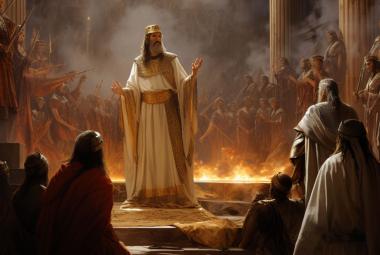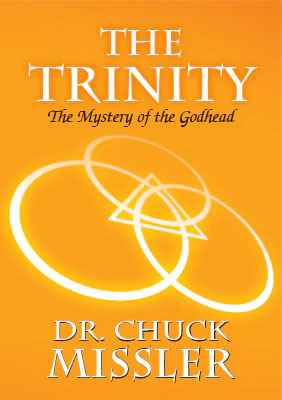How does one reconcile the "One God" of the Old Testament with the three "Persons" of the New Testament Trinity? The Sh'ma of Deuteronomy 6:4-5 clearly emphasizes the singularity of God, which is also reconfirmed in the ten commandments (Exodus 20:3), etc. Yet the New Testament clearly proclaims a three-person Godhead (Matthew 28:19, 2 Corinthians 13:14, John 14-17, etc.).
How does one deal with the ostensible tensions between the Old and New Testament revelations of the ultimate mystery of the Godhead?
The doctrine of the trinity has been at the heart of much theological controversy. The routine objection is that the doctrine sacrifices monotheism to tritheism. But this objection thrives on misconceptions of divine personality in the image of disparate, individual, human selves.
Rationalistic apologetics, promotive of trinitarianism on speculative rather than revelational grounds, regrettably encourages these misunderstandings.
Many of us also resort to convenient models to skirt these problems, and these, too, mislead rather than clarify. Favorites include three tones blending into one chord; a single ray of light of three primary colors; or water in the forms of ice, liquid, or steam. (As an executive, I have resorted to visualizing a corporation made up of three perfectly communicating partner-shareholders.)
But each of these are, at best, clumsy illustrations, inadequate to communicate aspects of an infinite God to our finite mind.
How should we deal with this challenging issue? By confining ourselves to what God, in His sovereignty, has revealed to us of Himself in His Word.
The Trinity in the Old Testament
There is no absurdity involved when it is contended that plurality can (and does) coexist with unity (i.e., as in Genesis 2:24: Adam + Eve become "One Flesh"; 1 + 1 = 1).
We discover that, from the first verse of Genesis, Elohim is a plural noun used with singular verbs. This plurality even shows up in our English translations in Genesis 1:26, 3:22, and 11: 7.
If we examine the text in Ecclesiastes 12:1, we note that the source text is also in the plural:
Remember now thy Creator(s) in the days of thy youth, while the evil days come not, nor the years draw nigh, when thou shalt say, I have no pleasure in them;
Also, Isaiah 54:5:
For thy Maker(s) [is] thine husband; the Lord of hosts [is] his name; and thy Redeemer the Holy One of Israel; The God of the whole earth shall he be called.
Isaiah 6
In the famous vision of the throne of God in Isaiah 6, we have the scene in the holy place of the holy ones, celebrated by the seraphim who veiled their faces before them: Holy, Holy, Holy. (Note that there are three declarations. This is reconfirmed in the similar scene in Revelation 4:8.) In Isaiah 6:8 we again see the hint of the plural: Who shall go for us?
Who is the Lord of Hosts ? All sources acknowledge its applicability to the Father. Yet it is provocative to notice that John attributes this passage to Christ (John 12:41), and Paul attributes it to the Holy Spirit (Acts 28:25). Thus, all three persons are included.
Jacob's Blessing
In Genesis 48:15-16, we note Jacob's considered preamble to his blessing:
And he blessed Joseph and said, God, before whom my fathers Abraham and Isaac did walk, the God which fed me all my life long unto this day, The Angel which redeemed me from all evil, bless the lads; and let my name be named on them, and the name of my fathers Abraham and Isaac; and let them grow into a multitude in the midst of the earth.
The God before whom my fathers did walk, The God who fed me, and the Angel who redeemed me, are all mentioned as objects of divine worship and the source of blessing: God the Father, God the source of illumination and comfort, and the Goel, the Redeemer.
The Benediction
The famous Old Testament benediction, Numbers 6:24-27:
The Lord bless thee, and keep thee: (The benevolent love of God, the Father of mercies and fountain of all good);
The Lord make his face shine upon thee, and be gracious unto thee: (The redeeming and reconciling grace of our Lord Jesus Christ);
The Lord lift up his countenance upon thee, and give thee peace. (The purity, consolation, and joy received by the communion of the Holy Spirit. )
Compare this with the New Testament benediction in 2 Corinthians 13:14:
The grace of the Lord Jesus Christ, and the love of God, and the communion of the Holy Ghost, [be] with you all. Amen.
Psalm 2
Carefully diagram Psalm 2 and you will discover that it is a trialogue among the three persons of the Trinity: the Father, the Son and the Holy Spirit.
The Integrity of the Book
It is amazing how many presumed difficulties begin to disappear when one discovers the integrity of the Bible: although composed of 66 books penned by 40 authors over thousands of years, it demonstrates an integrity of design--every detail, every place name, the subtleties of the text--all testify to its singular authorship.
The New Testament is in the Old Testament concealed; The Old Testament is in the New Testament revealed.
The Bible reveals to us:
the invisible Father, from whom all revelations proceed; the Son, who mediates and objectively incarnates that revelation as a historical reality; and the Holy Spirit, who is divinely outpoured and subjectively applies that revelation to each of us.







